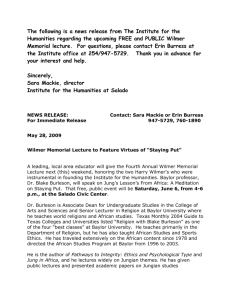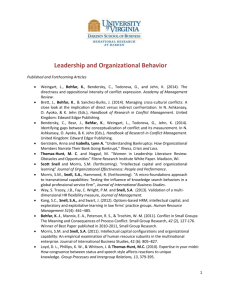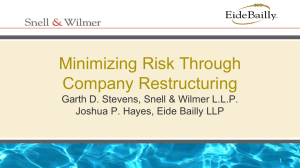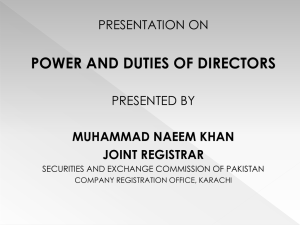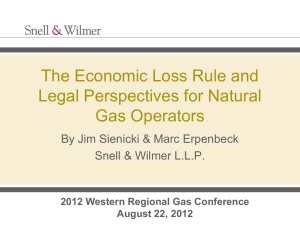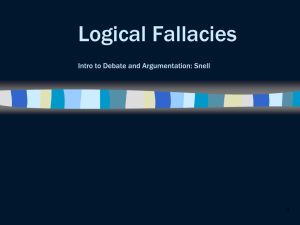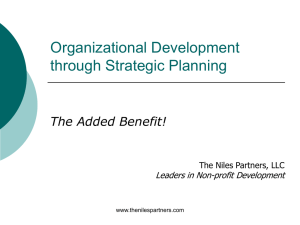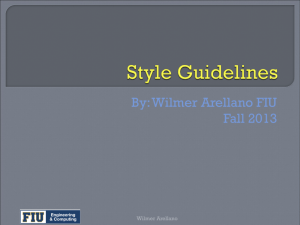View PowerPoint
advertisement
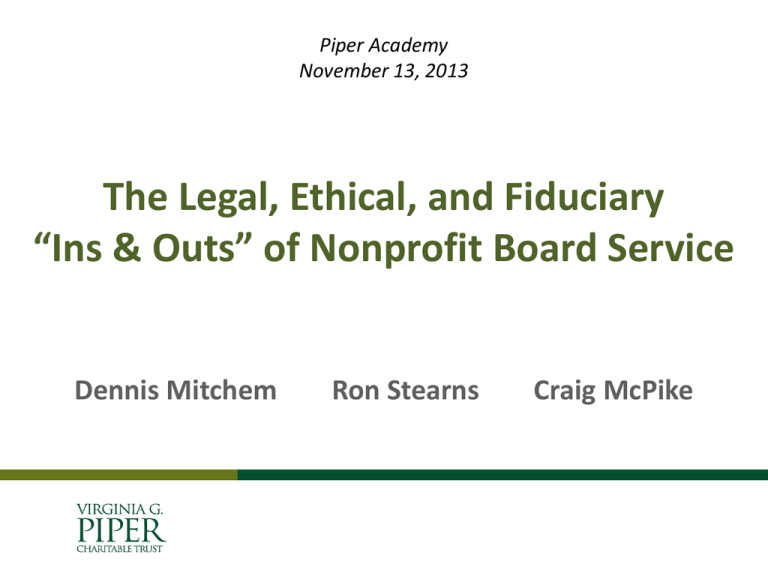
Piper Academy November 13, 2013 The Legal, Ethical, and Fiduciary “Ins & Outs” of Nonprofit Board Service Dennis Mitchem Ron Stearns Craig McPike • • • • Board Policies and Practices • Board Member Welcome Packet • Fiduciary Duties • Business Judgment Rule • Third-Party Reliance • Role in Management – Oversight vs. Involvement • Conflicts of Interest • Liability and Insurance Maintaining Tax-Exempt Status and Unrelated Business Income Financial Management Three G’s of Board Service Board Member Welcome Packet • • • An informed, engaged board facilitates effective governance Being “informed” includes understanding how the organization works Board member welcome package ◦ Articles, bylaws, tax-exempt documents Various policies Committee charters ◦ Director and officer information ◦ ◦ ©2011 Snell & Wilmer L.L.P. 3 Overview of Fiduciary Duties of Directors • Statutory Duties of Directors ◦ Under Arizona law, directors are required to discharge their duties - - in good faith with the care an ordinarily prudent person in a like position would exercise under similar circumstances (the "duty of care") in a manner the director reasonably believes to be in the best interests of the corporation (the "duty of loyalty") ©2013 Snell & Wilmer L.L.P. 4 Practical Suggestions in Discharging the Duty of Care • Generally, act in a reasonable and informed manner when participating in the board’s decisions and its oversight of management • Guidelines for a specific transaction or other decision ◦ ◦ ◦ ◦ ◦ Time commitment and regular attendance Careful deliberation among directors Directors should avoid not only haste, but the appearance of haste, in making decisions Major decisions should be made only after directors have had an opportunity to digest available information, which may require more than one meeting Review material information in advance of meetings ©2013 Snell & Wilmer L.L.P. 5 Practical Suggestions in Discharging the Duty of Care (cont.) ◦ Consider the advice of outside advisors, when appropriate - ◦ Internal advisors may be relied upon, but certain circumstances may support using outside advisors Outside advisors may be appropriate for legal, accounting and finance, among others Evaluate potential bias of outside advisor Directors should be convinced that the board's advisors are competent, were chosen with reasonable care and are providing reliable advice Ask questions to make an informed decision - Actively probe and test all information presented Actively judge its reliability and accuracy, and Request additional information, if necessary ©2013 Snell & Wilmer L.L.P. 6 Duty of Loyalty • Requires directors to exercise their powers ◦ ◦ • In the best interest of the organization Not for their own self-interest or the interest of another The duty of loyalty primarily relates to ◦ ◦ ◦ Conflicts of Interests Corporate Opportunity Confidentiality ©2013 Snell & Wilmer L.L.P. 7 Business Judgment Rule • Business Judgment Rule ◦ Common law doctrine expressly adopted by Arizona ◦ A director is presumed in all cases to have discharged his or her duties in accordance with the statutory requirements of good faith, care and loyalty ◦ “Clear and convincing evidence” required to successfully challenge a director's action or failure to act before the presumption is rebutted ©2013 Snell & Wilmer L.L.P. 8 Third-Party Reliance • • A director is entitled to rely on information, opinions, reports, or statements (including financial statements and other financial data) prepared or presented by ◦ Management: Officers and other Associates whom the director reasonably believes are reliable and competent in the matters presented ◦ Experts: Legal counsel, public accountants or other persons as to matters the director reasonably believes are within the person's professional or expert competence ◦ Committees: A committee of the board of which the director is not a member, if the director reasonably believes the committee merits confidence A director is not acting in good faith if he or she has knowledge contrary to the third party’s input ©2013 Snell & Wilmer L.L.P. 9 Role of Directors in Management of the Corporation – Oversight Function vs. Strategy • Under Arizona law ◦ ◦ • All corporate powers shall be exercised by or under the authority of the board of directors The affairs of the corporation shall be managed under the direction of its board of directors Director Oversight ◦ Do oversee management1 - ◦ Do not directly engage in day-to-day operations - • Directors not personally responsible for acts/omissions of management/third parties if prudently selected and reliance is reasonable Actual operations are a function of management Directors’ responsibility is limited to monitoring and overseeing management Increasing board focus on strategy ◦ ◦ ◦ Strategic planning tops “wish list” of public-company directors2 54% of public-company boards discuss strategy at every meeting3 Good benchmark for nonprofit boards ©2013 Snell & Wilmer L.L.P. 10 Risks of Action Outside Typical Responsibilities and Duties Action by directors that ◦ ◦ ◦ Is outside normal scope of director duties Is outside established lines of communication Impinges on specific functions of a committee could result in increased risk of liability for corporation and directors, and ◦ ◦ Could violate the reasonable-care standard Could violate the duty of care - ◦ May not be based on full available information May void protections otherwise available, such as the ability to rely on third-party information Could result in delay or failure to put the matter before the proper person or committee ©2011 Snell & Wilmer L.L.P. 11 Risks of Action Outside Typical Responsibilities and Duties (cont.) ◦ Could result in loss of attorney-client privilege or other important privileges otherwise available ◦ Could result in loss of control of written material (dissemination to outsiders) ◦ Could result in statements, writings or actions harmful in future governmental proceedings or litigation ◦ Could result in confusion of responsibilities and blurring lines of authority ◦ Could cause the board to lose sight of the largerscale monitoring that it is intended to provide ©2011 Snell & Wilmer L.L.P. 12 Heightened Scrutiny – “Disqualified Person” Transactions • Excess Benefit Transactions ◦ Transaction with “Disqualified Person” (DP), if ◦ value provided by organization > value received from DP “Disqualified Person” includes - - Insiders – Directors, Officers, Founders, Substantial Contributors, others with “substantial influence over the affairs of the organization” Family members of insiders Businesses owned or controlled by insiders and/or family members ©2011 Snell & Wilmer L.L.P. 13 Exposure for Excess Benefit Transactions and Rebuttable Presumption • Possible excise taxes on “excess benefit” ◦ ◦ ◦ ◦ DP liable for 25% – “first-tier” tax DP liable for 200% – “second-tier” tax DP must repay excess benefit with interest Organization managers – 10% excise tax for “knowing participation” • Organization cannot indemnify a party subject to excise taxes, or the indemnity will itself be an excess benefit transaction • Rebuttable Presumption of Reasonableness is available to shift burden of proof to IRS, with appropriate steps in advance ©2011 Snell & Wilmer L.L.P. 14 Conflict of Interest Policy and Questionnaire • Conflict of Interest Policy ◦ ◦ ◦ • Procedures to identify potential conflicts Procedures to identify disinterested members to vote Procedures to establish rebuttable presumption of reasonableness, if practical/desired Annual questionnaire for possible conflicts ◦ ◦ Facilitates compliance with conflict policy Permits positive response to question on Form 990 ©2011 Snell & Wilmer L.L.P. 15 Director Liability: Protections and Limitations • Liability can come in various forms ◦ ◦ ◦ • Protections ◦ ◦ • Exceeding scope of duties Engaging in excess benefit transactions Taking part in approval of another’s excess benefit transaction D&O Insurance Arizona law, with appropriate provisions in governing documents Limitations on Protections ◦ ◦ ◦ Excess benefit transactions – no protection Acting outside the scope of duties – possible limits “Reasonable” expenses ©2011 Snell & Wilmer L.L.P. 16 Maintaining Exempt Status • • • • • • No Private Inurement/Excess Benefit: To protect taxpayer subsidies of charitable organizations, Congress has imposed heightened scrutiny of arrangements with “disqualified persons” No Private Benefit: Assets and profits must be used to further charitable mission and not private interests Limited Unrelated Business Activities / Tax (UBIT): Limited activities not furthering charitable mission – taxed like corporation and threat to exempt status if considerable unrelated activities No Political Campaign Activity: No supporting or opposing candidates for office Limited Lobbying: Strict limitations on efforts to change the law or oppose a change in the law Annual Filings: IRS Form 990, Annual Report, Charitable Solicitation (if applicable in other states) ©2013 Snell & Wilmer L.L.P. 17 Unrelated Business Activities • For activities to be “charitable”, they must themselves further a charitable purpose ◦ ◦ Activities that merely raise funds to be used for a charitable purpose, without more, are not charitable – they are “unrelated” “Unrelated” activities are taxable just like a for-profit business - Expenses may be deducted - Exceptions for certain types of income, such as • • • - Rental of real property Stocks, bonds Royalties Exceptions don’t fully apply if “debt-financed” assets generate the income ©2011 Snell & Wilmer L.L.P. 18 Conclusion Any Questions? Thank you! ©2011 Snell & Wilmer L.L.P. 19 Endnotes Guidebook for Directors of Nonprofit Corporations, Second Ed. (2002), ABA Committee on Nonprofit Corporations, p. 24 2 PwC 2012 Annual Corporate Directors Survey 3 Deloitte 2012 Board Practices Report 1 ©2013 Snell & Wilmer L.L.P. 20 Thank You!
